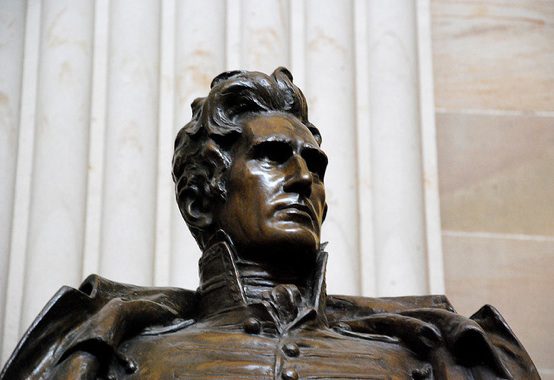Syria and the So-Called ‘Jacksonians’

Jarrett Stepman offers an odd interpretation of Republican support for Trump’s decision to order an attack on the Syrian government:
According to an ABC poll, 86 percent of Republicans supported the Syrian strike in response to President Bashar al-Assad’s use of chemical weapons, compared to only 22 percent of Republicans supporting Obama’s Syrian intervention in 2013. While James Hohmann of the Washington Post attributed this to sheer partisanship, there is another obvious explanation.
Most of the GOP base’s attitude toward foreign policy is what political scientist Walter Russell Mead has called “Jacksonian,” after America’s seventh president, Andrew Jackson.
They do not believe that the United States should go out in the world seeking monsters to destroy, but instead they view America’s international relations through the prism of what is specifically in our self-interest.
This explanation isn’t persuasive for a few reasons. First, attacking the Syrian government had nothing to do with American security or interests. It was a perfect example of using force for something other than “our self-interest,” so if most Republicans are actually “Jacksonians” as defined here they ought to be opposed to it. Since most Republicans back Trump’s attack but were strongly opposed to Obama’s proposed intervention, it seems much more likely that partisanship is the most significant reason for why so many people reversed their positions. If the “Jacksonian” label means anything in our foreign policy debates, it is supposed to refer to people that have no interest in international norms and institutions and care first and foremost about American security and military strength.
Firing off a few dozen missiles for the sake of enforcing a norm in the middle of a foreign civil war ought to displease “Jacksonians” immensely. Because it was unrelated to national security and because it wasted military resources on something that poses no threat to us, a “Jacksonian” ought to be very unhappy with Trump’s decision to attack Syria. The fact that it doesn’t appear to displease most Republicans tells us that “Jacksonian” is the wrong way to describe their views, unless we water down “Jacksonian” to mean someone who likes it when the president orders attacks on foreigners. For these people, it seems to be enough that it was Republican president who ordered military action against another government, and that was all that it took to get the vast majority of them to fall in line.
Then again, I have long maintained that the “Jacksonian” label is not very useful, and it often seems to be applied to describe positions that don’t match up with the pugnacious nationalism it is supposed to refer to. Explaining Republican support for attacking Syria in terms of “Jacksonianism” is a good example of how easily the label can be misapplied.
Comments